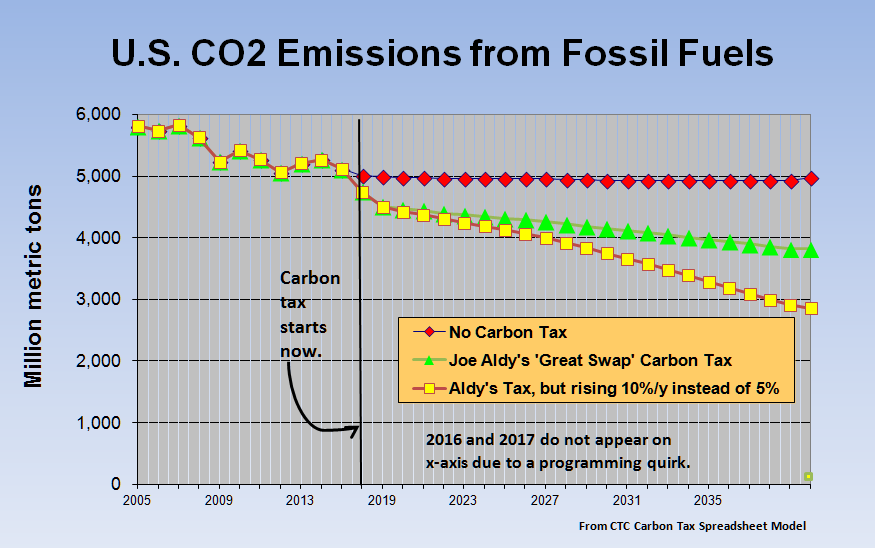A new report by Harvard economist Joe Aldy is getting some play in climate policy circles. Long-Term Carbon Policy: The Great Swap argues that the incoming administration might support a national carbon tax if it were made part of a deal to lower tax rates and jettison carbon regulations.
Aldy explains:
A smart deal to tackle climate change could abet tax and regulatory reform — which most Republicans support — by swapping a market-based carbon tax for sectoral regulatory policies — which most Republicans oppose. Such an approach could make even greater reductions in tax rates politically feasible and demonstrate that Republicans are in favor of smarter environmental policy, not simply opposed to all climate change policies.
To say we’re skeptical is putting it mildly. Why would a President Trump and an emboldened and still-Republican Congress take on a carbon tax to get stuff (gutted CO2 regs, lower taxes) they can almost certainly win straight up? But rather than point yet again to Republican denialism, we’re inviting you — fellow carbon tax proponents — to address Aldy’s carbon tax rate.

Under Aldy’s ‘Great Swap’ tax, 2025 emissions would be 26% less than in 2005, but only 13% below projected 2025 emissions with no tax.
Aldy’s carbon tax would start in 2018 at $25 per ton of CO2 and increase by 5% a year above the rate of general inflation. By 2025, he writes, it would reduce total U.S. carbon emissions by 26 percent.
Is that a lot or a little? A 26 percent reduction would be a lot if it were relative to 2016 emissions, or to 2025 emissions without a carbon tax. Unfortunately, the projected reduction is vis-a-vis levels in 2005 (the year used as a baseline in many climate-policy discussions).
Aldy isn’t perfectly clear on that point. He states in his report:
This carbon tax would lower U.S. carbon dioxide emissions 26 percent by 2025 — consistent with our nation’s pledge at the Paris climate summit last year –and more than 30 percent by 2030.
No 2005 baseline there, though we’re sure Aldy intended it. Clarity is critical because carbon emissions have already fallen a great deal. Compared to 2005, U.S. emissions last year were already 12 percent less, which is nearly half the distance to 26 percent. And emissions are set to fall further this year, as reductions from coal’s continued plunge in the electricity sector outweigh the increase in gas-guzzling caused by cheap gasoline.
Moreover, according to CTC’s carbon-tax model, which perfectly matches Aldy’s estimate of the impact of his carbon tax (our model says the reduction from 2005 would be 25.7 percent), U.S. emissions in 2025 without a carbon tax will be nearly 15 percent below the 2005 baseline. The Aldy carbon tax would cut emissions by only another 13 percent.
Is that a lot or a little? I guess it depends. It’s precious little in an Obama or Clinton world, not to mention a Sanders world. It’s not so small, perhaps, in a Trump world. Still, maybe Aldy — or another expert or advocate — could get more aggressive with the tax rate? The same tax increasing at 10% a year (above inflation) rather than 5% would reduce 2025 emissions by 29% (relative to 2005), with reductions accelerating and reaching 40% by 2033. Why not start the conversation there?
We invite readers to download CTC’s carbon tax model to see for themselves how fast Joe Aldy’s tax, or different ones, would drive down U.S. carbon emissions. Dust off your copy of Excel and click here. Our Web page Carbon Tax Effectiveness goes behind the model curtain to reveal what / why / how.

James Handley says
At the PPI event on Wednesday, Prof. Adly acknowledged that Trump & Republican-controlled Congress could stop EPA’s Clean Power Plan. But he suggested that the U.S, could suffer trade and diplomatic consequences, noting that repudiating the Paris agreement would discourage international cooperation on other matters that may be more important to the incoming Administration.
On your second point, Adly’s report admits that the initial rate is not sufficient. On pp 30- 31, he suggests a periodic adjustment mechanism to assure that the carbon tax rises quickly enough to hit the Paris targets and subsequent emissions goals.
Rachael L Sotos says
A relief to know that Adly suggests a periodic adjustment mechanism. Is there any relation between the modesty of Adly’s $25 and present Canadian plans? Does the rumor about Trump considering Rex Tillerson for SOS imply that the modest swap might have some traction?
James Handley says
See: Trump: Deal-maker for a Carbon Tax Swap? https://carbontaxnetwork.org/2016/12/01/trump-deal-maker-for-a-carbon-tax-swap/